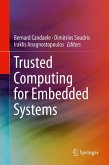This book provides a systematic and unified methodology, including basic principles and reusable processes, for dynamic memory management (DMM) in embedded systems. The authors describe in detail how to design and optimize the use of dynamic memory in modern, multimedia and network applications, targeting the latest generation of portable embedded systems, such as smartphones. Coverage includes a variety of design and optimization topics in electronic design automation of DMM, from high-level software optimization to microarchitecture-level hardware support. The authors describe the design of multi-layer dynamic data structures for the final memory hierarchy layers of the target portable embedded systems and how to create a low-fragmentation, cost-efficient, dynamic memory management subsystem out of configurable components for the particular memory allocation and de-allocation patterns for each type of application. The design methodology described in this book is based on propagating constraints among design decisions from multiple abstraction levels (both hardware and software) and customizing DMM according to application-specific data access and storage behaviors.
"This book presents a DMM optimization approach based on dynamic memory exploration of multimedia and network applications. It explains fundamental memory problems requiring optimization and also provides the details of the proposed optimization framework. Therefore, the book is helpful both as a reference book for those who want to learn general memory optimization concepts and as a guide for those who want to apply a similar optimization technique on their systems." (Isil Oz, Computing Reviews, May, 2015)








